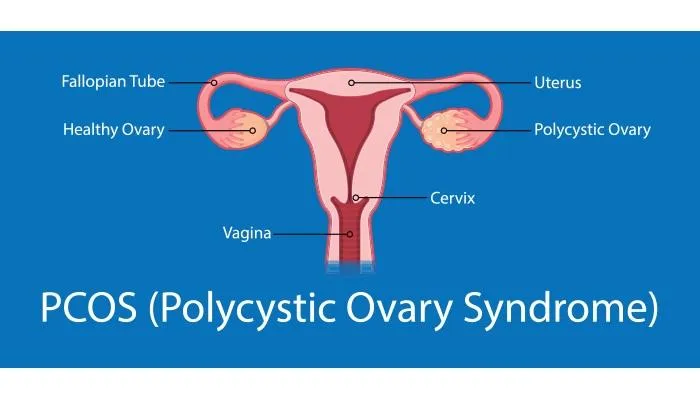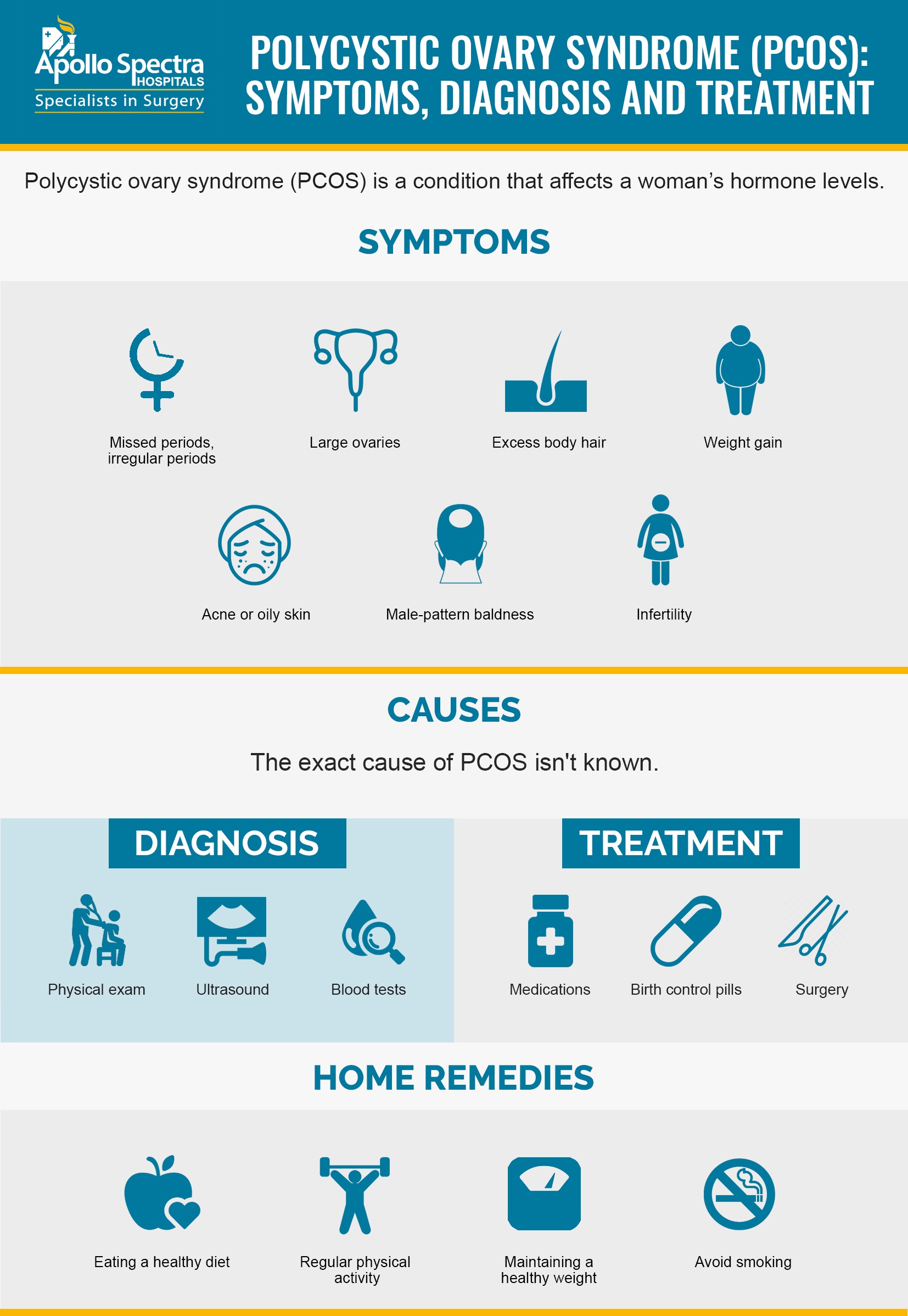Polycystic ovary syndrome (PCOS) - Symptoms and causes
March 30, 2020

Polycystic Ovary Syndrome is a hormonal condition that affects women in their childbearing years, from 15 to 44 years. It is a common condition that can affect any woman. However, many women with this condition never get diagnosed. PCOS affects the ovaries, the reproductive organs responsible for producing progesterone and estrogen. These are the hormones regulating the menstrual cycle in women. The ovaries also release an egg each month. Luteinizing hormone (LH) and Follicle-stimulating hormone (FSH) for controlling ovulation. FSH is responsible for stimulating the ovary to produce follicles (the sac that has the egg). The LH then triggers the release of the mature egg from the ovary.
PCOS is a syndrome affecting ovaries and ovulation. The three main features of PCOS are- high male hormone levels, cysts in the ovaries, and skipped or irregular periods. When a woman has PCOS, several fluid-filled sacs start growing inside the ovaries. These sacs are follicles. Each of them has an immature egg that couldn’t trigger ovulation. The lack of ovulation will lead to altered levels of progesterone, estrogen, FSH, and LH. Androgen, the male hormone, levels will increase leading to the disruption of the menstrual cycle.
Cause of Polycystic Ovary Syndrome (PCOC)
The exact cause of PCOS is still unknown. However, some doctors believe that high male hormone levels might be preventing the ovaries from making eggs and producing hormones normally. Some factors have been linked to the excess production of androgen in the body:
- Genes
Studies have shown that PCOS can be hereditary. However, it is possible that it is not one, but many genes, that contribute to PCOS.
- Insulin resistance
About 70% of women who have PCOS also have insulin resistance. This means that their cells are not able to use insulin properly. Insulin is a hormone produced by the pancreas for helping the body use the sugar for energy. When the cells are unable to use the insulin, the demand for insulin increases in the body. To compensate for this need, the pancreas makes more insulin. All this extra insulin is responsible for triggering the ovaries to make more male hormones. Also, insulin resistance and obesity can increase the risk of type 2 diabetes as well.
- Inflammation
Women who have PCOS usually have an increased inflammation level in the body. This might be because of being overweight. Studies have shown that there is a link between higher androgen levels and excess inflammation.
Symptoms of Polycystic Ovary Syndrome
Some women show symptoms of PCOS when they have their first period. While others discover it when they are having trouble getting pregnant or have gained a lot of weight. Here are some common symptoms of the Polycystic Ovary Syndrome:
- Irregular periods - PCOS affects the ovulation process. So, the uterine lining won’t be shedding every month. Some women with this condition get less than 8 periods a year.
- Heavy bleeding - Since your uterine lining will be building up for a long period of time, your periods will be heavier than normal.
- Acne - Due to the increase in male hormones in the body, your skin will become oilier than usual. This will lead to breakouts on areas like the chest, face, and upper back.
- Hair growth - Women with this condition usually start growing excess hair on their faces as well as the body (belly, back, and chest). This condition where hair growth is excessive is known as hirsutism.
- Weight gain - About 80% of all women facing this condition are either overweight or obese.
- Male pattern baldness - Hair on the scalp will start getting thinner and eventually fall out.
- Headaches - Due to hormonal changes, headaches can be triggered in some women.
- Darkening of the skin - PCOS can lead to the creation of dark patches on the skin on the neck, under the breasts and in the groin.
PCOS effect on the body
PCOS can have several effects on your body, including the following:
- Infertility - You have to ovulate to get pregnant. Since PCOS affects your ability to ovulate, it affects your ability to get pregnant as well. In fact, one of the leading causes of female infertility is PCOS.
- Metabolic syndrome - PCOS can lead to obesity. This puts you at risk for high blood pressure, high blood sugar, high LDL cholesterol, and low HDL cholesterol. Together, this results in metabolic syndrome which makes you vulnerable to stroke, diabetes, and heart disease.
- Sleep apnea - This is the condition where, during the night, the women have repeated pauses in breathing.
- Endometrial cancer - When you are not ovulating every month, the uterine lining can get built up. This increases the risk of endometrial cancer.
- Depression - Hormonal changes and symptoms of PCOS can have a negative effect on the emotions causing you to get anxious and depressed.
Learn about the hormonal condition affecting women in their childbearing years, causing irregular periods, acne, weight gain, and more. Discover the causes and effects of PCOS on the body.
NOTICE BOARD
CONTACT US
CONTACT US
 Book Appointment
Book Appointment


.svg)
.svg)
.svg)
.svg)








